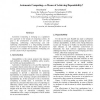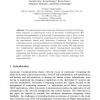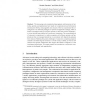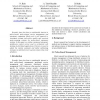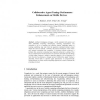110
click to vote
IEEEAMS
2003
IEEE
15 years 7 months ago
2003
IEEE
Autonomic computing – self-configuring, self-healing, self-optimizing applications, systems and networks – is widely believed to be a promising solution to everincreasing syst...
136
Voted
ECBS
2003
IEEE
15 years 7 months ago
2003
IEEE
Autonomic Computing is emerging as a significant new approach to the design of computing systems. Its goal is the development of systems that are selfconfiguring, self-healing, se...
112
click to vote
DEXAW
2003
IEEE
15 years 7 months ago
2003
IEEE
Autonomic Computing is a promising new concept in system development. It aims to (i) increase reliability by designing systems to be self-protecting and self-healing; and (ii) inc...
WAC
2004
Springer
15 years 7 months ago
2004
Springer
Abstract. This paper presents some important directions in the use of ontologybased semantics in achieving the vision of Autonomic Communications. We examine the requirements of Au...
130
click to vote
UPP
2004
Springer
15 years 7 months ago
2004
Springer
Abstract. The increasing scale complexity, heterogeneity and dynamism of networks, systems and applications have made our computational and information infrastructure brittle, unma...
121
click to vote
UPP
2004
Springer
15 years 7 months ago
2004
Springer
Abstract. Traditionally, autonomic computing is envisioned as replacing the human factor in the deployment, administration and maintenance of computer systems that are ever more co...
100
click to vote
POLICY
2004
Springer
15 years 7 months ago
2004
Springer
Recently, there has been a considerable interest in policy-based, goal-oriented service management and autonomic computing. Much work is still required to investigate designs and ...
114
click to vote
GCC
2004
Springer
15 years 7 months ago
2004
Springer
Autonomic Computing is a concept that brings together many fields of computing with the purpose of creating computing systems that are reflective and self-adaptive. In this paper ...
121
click to vote
ATAL
2004
Springer
15 years 7 months ago
2004
Springer
The goal of autonomic computing is to create computing systems capable of managing themselves to a far greater extent than they do today. This paper presents Unity, a decentralize...
111
Voted
ESAW
2005
Springer
15 years 7 months ago
2005
Springer
Ambient intelligence envisages a world saturated with sensors and other embedded computing technologies, operating transparently, and accessible to all in a seamless and intuitive ...

